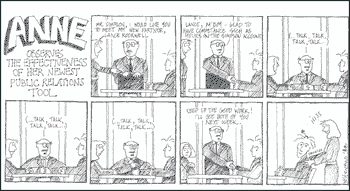|
Thinking Like Owners
Sandra Berman and I are
currently involved in research to evaluate the course as a tool for training
women in democratic business structures and we have been interviewing the women
who participated in the program. All but two are either working or have
returned to school; seven are working in co-op organizations, five as a direct
result of the program. One feasibility projects had examined the possibility of
a co-op to promote the work of women artists. Following the completion of the
program the three women involved in the project continued to develop their
idea. They successfully applied for a Federal training grant to increase their
skills in bookkeeping, marketing and computer graphics and are now in the
process of bringing their idea to life as the West Coast Women Artists'
Society.
As researchers, we have been specially interested in examining
the relationship between the concrete co-op/group training and the personal
changes that occurred. There is no question that the program was empowering.
For all the women it was a very meaningful experience, for several it was a
turning-point in their lives. Many of the women now define themselves in much
stronger terms than they did initially: they see themselves as people who can
"stand up for what I want", who "can take risks", who "have something important
to say."
As educators, we are interested in
understanding how personal development can be integrated into teaching co-op
sector participation. Previous co-op experience was not required of every
individual who entered the program, although almost half the students had some
co-op background (several lived in housing co-ops). At the start of the
program, many of the women expressed anxiety and insecurity about co-ops and
co-op business training in particular. However, as the personal and working
relationships developed, their confidence increased and they began to take on
more responsibilities in their classroom studies and at the work placement.
Several participants have told us they could now imagine themselves as active
participants in a co-op as a result of the information and support they
experienced in the program.
Although we have not
yet completed our evaluation of the program, we have re-affirmed the importance
of the link between personal empowerment and change on a larger scale, in this
case through the establishment of democratic business structures. It is clear
to us that for co-operative management training program to be effective, it
must be built around individual growth and development.
Melanie Conn has been working with Community Economic
Options since 1985. She is involved in education, research and consulting in
the area of community economic development as a strategy to empower women.

|
